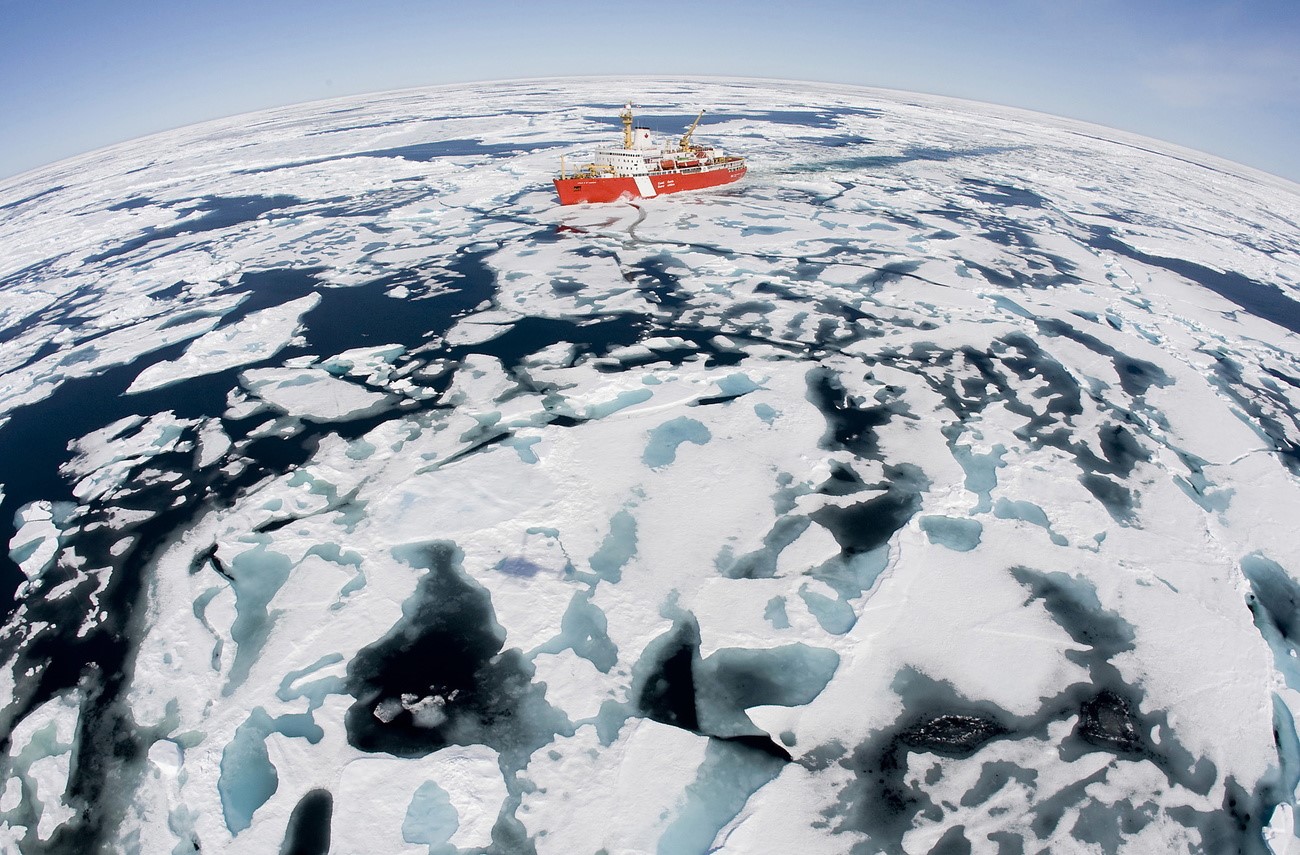
Averting conflict can become Switzerland’s role in Arctic science diplomacy
The Arctic is no longer a remote frontier. It is a geopolitical and environmental epicentre whose transformations reverberate across the globe. Switzerland, an observer state on the Arctic Council, is making meaningful contributions to Arctic governance and multilateral dialogue.
As climate change accelerates, the Arctic is warming up four times faster than the global average, leading to dramatic shifts in sea ice, permafrost, and ecosystems. These changes are not confined to the Polar circle; they affect global weather patterns, sea levels, and biodiversity, making the Arctic a global early-warning system for planetary healthExternal link.
Simultaneously, the Arctic is becoming a strategic hotspot. Melting ice is unlocking new shipping routes and exposing potentially vast reserves of oil, gas, and rare-earth minerals, which could intensify competition among Arctic and non-Arctic states. The region’s geopolitical landscape is shifting, not least owing to increased militarisation and strained cooperation, especially following Russia’s invasion of Ukraine, which disrupted long-standing scientific and diplomatic ties.
In this context, science diplomacy has emerged as a vital tool for fostering international cooperation and informed policymaking. Switzerland, which is an observer in the Arctic Council (the main intergovernmental body on Arctic affairs), plays an important role through its scientific expertise, neutrality and the convening power of International Geneva. This allows the country to contribute meaningfully to Arctic governance, climate research, and multilateral dialogue.
Science diplomacy a bridge in turbulent times
Science diplomacyExternal link encompasses three dimensions: science in diplomacy (informing policy), science for diplomacy (building relationships), and diplomacy for science (facilitating research). It is focused on developments in the natural world and their potential impacts on humanity, and specifically appeals to the shared interest of states, or their mutually perceived threats.

More
Explainer: why should we care about science diplomacy?
History offers plenty of examples where science diplomacy helped to rebuild trust and to illustrate the benefits of cooperation between adversarial states. During the Cold War, even though the two superpowers were otherwise at loggerheads, science diplomacy led, for example, to the eradication of smallpox and the first efforts to close the hole in the ozone layer. The key factor is for opponents to recognise that, despite their stark differences, they can and must find ways to cooperate when it comes to common threats, particularly existential ones.
The Arctic region has historically served as a model for international diplomacy and scientific collaboration. Examples range from joint international expeditions in the region to the establishment of the Arctic Council, an intergovernmental forum that has enabled environmental protection initiatives, sustainable development programmes, and scientific research coordination.
Another example is the International Arctic Science Committee (IASC), which facilitates international scientific cooperation in the Arctic, and which includes scientists from over 20 countries.
+ How climate change is threatening permafrost’s delicate balance
Now, as the ice melts faster, the need for effective dialogue and cooperation is more pressing than ever. Switzerland, and particularly International Geneva, is uniquely positioned to play a role in facilitating this dialogue and addressing the most urgent issues facing the Arctic.
Switzerland’s leverage: a neutral voice in a fractured world
Switzerland’s role in this domain is shaped by growing geopolitical fragmentation. Russia’s war in Ukraine has not only reshaped European security dynamics but also fractured Arctic cooperation, with Russia effectively sidelined from key scientific and diplomatic platforms such as the Arctic Council. This exclusion has disrupted decades of collaborative climate research, undermining global efforts to monitor and mitigate environmental challenges.
+ Arctic science collaboration is on thin ice
Well beyond the Arctic, Russia’s trampling of fundamental norms governing international relations – not least that of state sovereignty – has enormously damaged trust with the West, and triggered systemic shocks across the multilateral system.
More recently, the return of Donald Trump to the White House has introduced new uncertainties. These shifts threaten multilateral frameworks that underpin science diplomacy, including endangering those very organisations that are best equipped to help humanity understand and address these urgent challenges.
Many countries have paused international collaboration across the geopolitical divide, especially in sensitive research areas, due to national security concerns. Funding has declined for projects connecting scientists from both sides, and increased scrutiny has had a chilling effect on academic freedom. As a result, global scientific networks are fragmenting, making it harder to address shared challenges like climate change and potential pandemics.
Meanwhile, the Swiss foreign policy strategy for 2024–2027 underscores a knowledge-based approach, by noting that Switzerland’s leading position in “education, research, and innovation” provides a “good basis for high-profile science diplomacy”.

More
Switzerland has a role to play in the Arctic
Moreover, it highlights how science can contribute to diplomatic efforts in peace promotion, global governance, and evidence-based foreign policy actions. As Swiss Foreign Minister Ignazio Cassis wrote in 2019 on Swissinfo: “Science diplomacy is a key instrument for fostering cooperation between states.” In an op-ed, Cassis also described science diplomacy as “an opportunity for Switzerland to showcase the excellence of its scientific base in support of global dialogue”.
Time for dialogue
In that context, as stated earlier the Arctic is a strategic crossroads where geopolitics, competing security priorities, indigenous rights, economic opportunities, and environmental stewardship converge.
One of the key platforms for discussing these issues is the High North Talks, an informal initiative that brings together policymakers, scientists, and experts from relevant states to discuss the most pressing Arctic-related matters. These talks, hosted by the Geneva Centre for Security Policy (GCSP), are one of the few remaining venues where representatives from the countries most invested in the Arctic can meet, in a safe and discreet environment, to discuss the future of the region.
The High North Talks are structured around three sets of issues: environmental/scientific (where ideas are developed for renewing exchanges on the most urgent scientific problems), security, and governance. These tracks aim to foster dialogue and identify pockets of cooperation among Arctic stakeholders, even amid geopolitical tensions.
+ Central Asian glaciers resisted climate change. That may be ending
The objective of these discussions is to develop creative ideas for mitigating the consequences of the widening geopolitical chasm and the lack of official dialogue on the Arctic. They also aim to promote understanding, cooperation and action on the most urgent issues.
Since 2022, the High North Talks have developed creative policy ideas for addressing some of the key challenges facing the Arctic. While much work remains, the dialogue has unearthed ways to promote greater collaboration in research and monitoring, with a view to enhancing mutual understanding of the region’s rapidly evolving environment, and its likely impact on the wider world.
Conversations around security have aimed to rebuild some trust and reduce tensions among Arctic states. This track is developing confidence-building measures to avoid miscommunication, clarify misunderstandings, understand each other’s core interests, and prevent dangerous incidents. Discussions on sustainable development have also helped bring attention to the importance of inclusive and equitable growth that considers the needs of all stakeholders, particularly the actual inhabitants of the Arctic, including Indigenous Peoples.
The GCSP’s role in driving these conversations highlights International Geneva’s, and Switzerland’s, quiet power as a global hub for formal as well as informal diplomacy.

More
Our weekly newsletter on geopolitics
Edited by Benjamin von Wyl/gw/dos
The views expressed by the authors do not necessarily reflect those of Swissinfo.

In compliance with the JTI standards
More: SWI swissinfo.ch certified by the Journalism Trust Initiative


























You can find an overview of ongoing debates with our journalists here . Please join us!
If you want to start a conversation about a topic raised in this article or want to report factual errors, email us at english@swissinfo.ch.